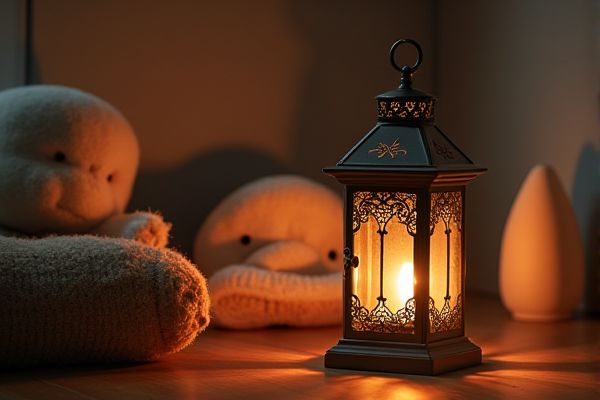
Decorative lanterns prioritize aesthetic appeal and ambiance, often featuring intricate designs and softer lighting to enhance your space visually, while functional lanterns focus on providing reliable, practical illumination for tasks or outdoor use with brighter, more durable light sources. Explore the article to understand which lantern type best suits your needs and how to choose the perfect one for your environment.
Table of Comparison
| Feature | Decorative Lantern | Functional Lantern |
|---|---|---|
| Primary Purpose | Enhance aesthetic appeal | Provide reliable illumination |
| Design | Ornate, artistic, varied styles | Practical, sturdy, focused light output |
| Light Source | Often low-intensity LEDs or candles | High-intensity bulbs, LEDs, or fuel-based |
| Durability | Less durable; intended for indoor or sheltered use | High durability; suitable for outdoor and rugged conditions |
| Portability | Usually stationary or limited mobility | Designed for easy transport and outdoor use |
| Power Source | Batteries, candles, or none | Batteries, rechargeable cells, fuel (gas, oil) |
| Typical Usage | Home decor, event decoration, ambiance setting | Camping, emergencies, outdoor activities |
| Price Range | Low to mid-range | Mid to high-range depending on features |
Introduction to Decorative and Functional Lanterns
Decorative lanterns emphasize aesthetic appeal, often featuring intricate designs, vibrant colors, and materials like stained glass or metalwork to enhance ambiance in gardens or indoor spaces. Functional lanterns prioritize utility with durable construction, weather resistance, and high-lumen light sources such as LED or battery-operated bulbs for reliable illumination during camping, emergencies, or outdoor activities. Both types serve distinct purposes, blending style with practicality depending on user needs.
Defining Decorative Lanterns
Decorative lanterns emphasize aesthetic appeal, featuring intricate designs, vibrant colors, and materials like stained glass or wrought iron to enhance ambiance and style in indoor or outdoor settings. Unlike functional lanterns designed primarily for illumination and durability, decorative lanterns often use LED lights or candles to create mood lighting rather than strong brightness. These lanterns serve as ornamental pieces that complement home decor, gardens, patios, or event themes without the primary focus on practical lighting performance.
Characteristics of Functional Lanterns
Functional lanterns prioritize durability and brightness, often featuring weather-resistant materials and high-lumen LED bulbs for effective illumination. They include practical designs such as adjustable brightness settings, long battery life, and portability for outdoor activities or emergency use. Many functional lanterns also incorporate rechargeable power sources and impact-resistant casings to withstand tough conditions.
Design Differences: Aesthetic vs Utility
Decorative lanterns prioritize intricate designs, ornate patterns, and visually appealing materials to enhance your interior or landscape aesthetics, often featuring colorful glass or artistic metalwork. Functional lanterns emphasize practical elements such as durability, brightness, and weather resistance, designed for effective illumination in outdoor or emergency situations. The key design difference lies in decorative lanterns serving as style statements, while functional lanterns focus on utility and performance.
Materials and Craftsmanship
Decorative lanterns often feature intricate designs crafted from lightweight metals, glass, or wood, emphasizing aesthetic details like etching or colorful finishes. Functional lanterns prioritize durable materials such as heavy-duty aluminum, stainless steel, or shatterproof glass to withstand outdoor conditions and provide reliable illumination. Your choice hinges on whether you value artistry and ambiance or resilience and practicality in lighting solutions.
Lighting Capability and Performance
Decorative lanterns prioritize aesthetics over brightness, often using lower-wattage bulbs or LED lights that emit soft, ambient illumination suitable for enhancing mood and style. Functional lanterns deliver stronger, more consistent lighting with higher lumens output, designed to provide practical visibility in outdoor settings or during power outages. Your choice depends on whether you need a lantern for decorative ambiance or reliable illumination in critical situations.
Popular Uses for Decorative Lanterns
Decorative lanterns are primarily used to enhance ambiance in indoor and outdoor spaces, such as patios, gardens, and living rooms, featuring intricate designs and soft lighting to create a cozy atmosphere. They often serve as statement pieces or seasonal decor, making them popular for events like weddings, holidays, and parties. Your choice of decorative lantern can transform a setting by adding aesthetic appeal without necessarily providing strong illumination.
Common Applications of Functional Lanterns
Functional lanterns are primarily used for outdoor activities such as camping, hiking, and emergency situations due to their reliable light sources and portability. They provide essential illumination for tasks like navigating trails, setting up tents, and power outages in homes. Unlike decorative lanterns, functional lanterns often feature durable materials, weather resistance, and adjustable brightness levels tailored to practical use.
Choosing the Right Lantern for Your Needs
When choosing the right lantern for your needs, consider whether your priority is ambiance or practicality. Decorative lanterns enhance aesthetic appeal with soft, mood-setting light, ideal for events or home decor, while functional lanterns provide reliable, bright illumination suited for camping, emergencies, or workspaces. Assess your lighting requirements to determine if durability, brightness, or style takes precedence in your decision.
Conclusion: Comparing Decorative and Functional Lanterns
Decorative lanterns prioritize aesthetic appeal with intricate designs and ambient lighting, while functional lanterns emphasize durability, brightness, and practical features like weather resistance and long battery life. Your choice depends on whether you value ambiance and style or reliable illumination for outdoor activities. Both types offer unique benefits, making it essential to match lantern features with your specific needs.
 homyna.com
homyna.com